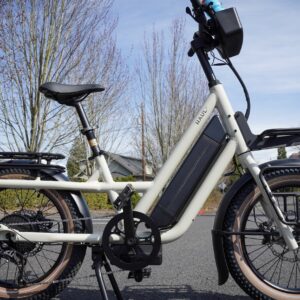
With just 10 days left in the legislative session, e-bike advocates are making a big push to get a key bill over the finish line. Typically the formation of an official state task force isn’t something folks get excited about. In fact, pushing an important issue into a committee is something many of the advocates lobbying for House Bill 4067 might, in other circumstances, fight tooth-and-nail.
But what HB 4067 would do, establish a new Oregon Department of Transportation Task Force on Electric Mobility, is considered a vital step forward in the effort to legitimize e-bikes, scooters, and a range of promising lightweight electric vehicles. Since BikePortland first reported on this bill before the session began back in January, its importance has grown considerably because of its close connection to another e-bike bill, HB 4103.
When HB 4103 passed the House this week (note that both bills originated in a joint committee and therefore aren’t subject to deadlines like single chamber bills) it was stripped of its most consequential provisions. Heralded as a compromise between lawmakers and advocates in Bend and Portland, there was a general agreement that its substantive proposals needed more debate and discussion so that a more comprehensive and effective bill could emerge next year. E-bikes are so popular and their impact on the mobility of Oregonians could be so vast, the thinking goes, advocates want to make sure any new laws or new regulations help reach that potential instead of kneecap it.
That’s why The Street Trust and its partners put out an action alert yesterday urging members to contact lawmakers and telling them to pass HB 4067. After it passed the Joint Committee on Transportation alongside HB 4103, the task force bill was referred to the Joint Committee on Ways & Means. Why? Because all bills that have a fiscal impact on the state budget must be approved by Ways & Means.
The current price tag is $200,000. That money would be used to pay for administrative overhead and staff needed set up the task force.
If the bill passes, Governor Tina Kotek must appoint 19 members who will, “work to address the problems not solved by HB 4103,” The Street Trust states in its action alert. The background and expertise required of each committee member is prescribed in the bill, which lays out specifically what type of appointees are needed. Here’s the roster, taken from the bill text:
- Two members who represent the Department of Transportation.
- One member who represents a local government parks and recreation department.
- Three members who represent electric micromobility device operators, manufacturers or businesses.
- One member who represents law enforcement and emergency medical services.
- One member who represents a city with a population greater than 500,000 and one member who represents a city with a population of 500,000 or fewer.
- One member who represents a county government.
- One member who represents a metropolitan planning organization.
- One member who represents a public university.
- One member who represents the insurance industry.
- One member who represents a nonprofit organization with statewide experience on transportation electrification and micromobility.
- One member who represents roadway users with disabilities.
- One member who represents an association that represents motor vehicle users.
- Two members who represent active transportation organizations.
- One member who represents mixed-use trail users.
And what these folks must work on for the coming year is also clearly spelled out in the bill. Their marching orders are to:
- Review the existing Oregon laws relating to micromobility and personal mobility devices;
- Examine whether safety and education requirements should be required for motor vehicle users, electric micromobility device manufacturers, retailers and user groups;
- Examine how electric micromobility devices can be best utilized to promote equity, safety and climate goals in the transportation sector;
- Examine best practices for the use of electric micromobility devices, including but not limited to use on highways, bicycle paths, bicycle lanes, public lands, public spaces and mixed-use trails;
- Examine statutory definitions of electric micromobility devices;
- Address electric micromobility devices for commercial use;
- Examine provided education and certification programs relating to electric micromobility devices
And there won’t be time to dilly-dally, because their recommendations must be submitted to lawmakers by December 1st of this year, in time for the 2025 session.
If those sounds like important issues to you, The Street Trust says you should reach out to three lawmakers who are in position to move the bill forward: Senate President Rob Wagner, House Speaker Dan Rayfield, and Joint Committee on Ways & Means Co-Chair Tawna Sanchez.






Thanks for reading.
BikePortland has served this community with independent community journalism since 2005. We rely on subscriptions from readers like you to survive. Your financial support is vital in keeping this valuable resource alive and well.
Please subscribe today to strengthen and expand our work.
They just want to make money. Homeless, single men hustling bottles don’t deserve to be harassed for trying to survive. Ebikes allow me to stay off social media and focus on real life. Cars go 200mph and kill over 190,000 people a year. Oregon has one accident [Moderator: deleted last phrase, sexist.]
NYT this morning… https://www.nytimes.com/2024/03/05/nyregion/nyc-cyclist-deaths-ebike.html